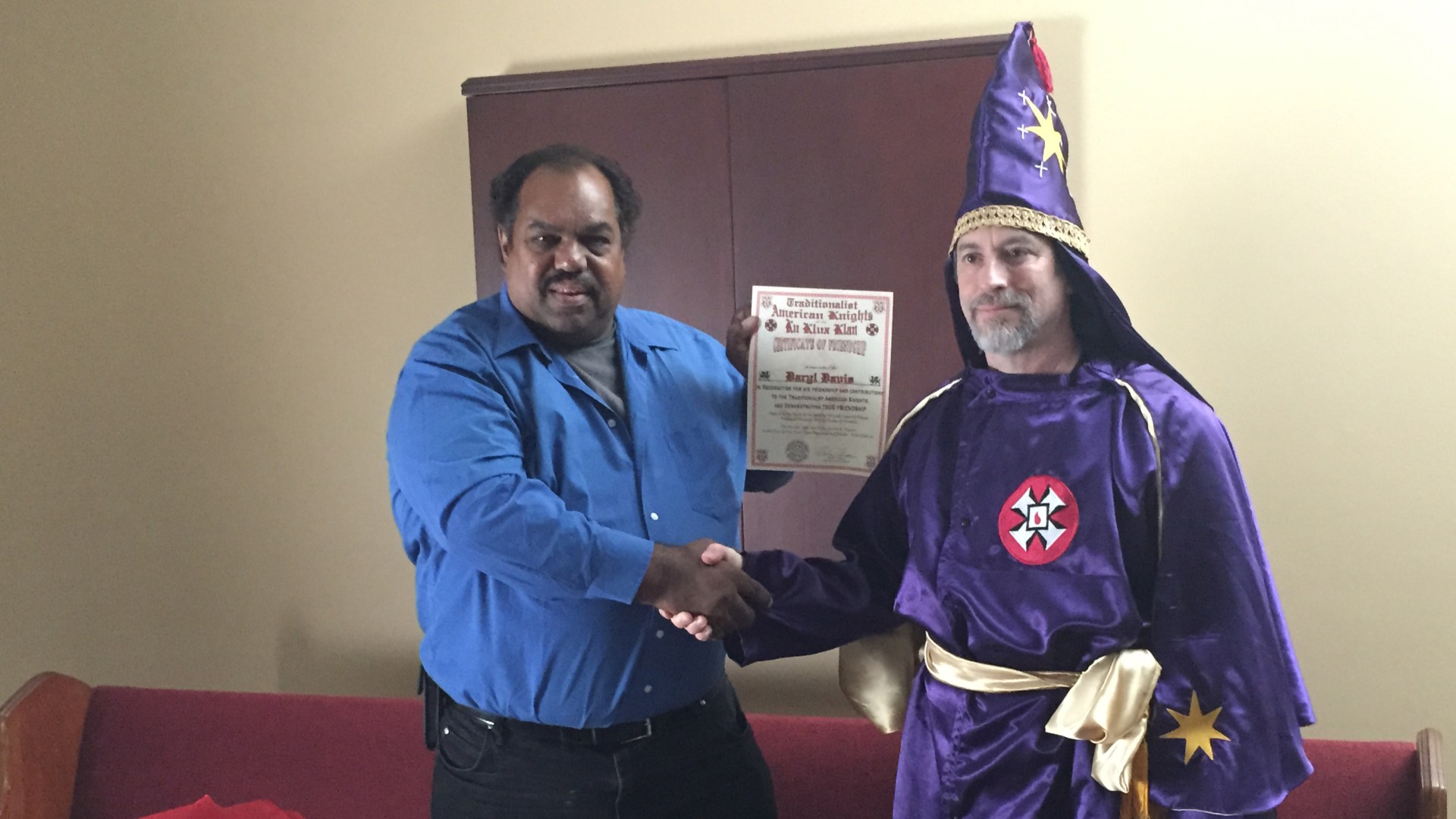When someone Daryl Davis has befriended leaves the Ku Klux Klan, he often gives Davis the robe he wore as a member of that group. Over the years, Davis, by his own account, has amassed dozens of these retired jerseys of hate. Accidental Courtesy: Daryl Davis, Race & America, which premiered this week at SXSW, chronicles Davis’s attempts to impact America by changing the hearts and minds of one racist at a time.
Davis goes to Klan rallies. He has invited Klansmen to his home and visited them. He calls some of them “friend” even as they call him inferior. In one moving segment, the film recounts how Davis met the daughters of an incarcerated Klan member at the airport and drove them to the prison so that they could visit their father. Eventually the family noticed that none of the man’s Klan colleagues were serving or loving them as much as Davis was. Their ideology of hate collapsed in the face of undeserved compassion.
“When something bothers me, I try to learn about it,” Davis told me in an exclusive interview at the Austin-based film festival after Accidental Courtesy premiered. Part of what makes him so effective at talking to the Klan is that he has read every book he can find on the subject. He asks questions. He gathers information. He listens. Often, it is readily apparent that he knows more about the Klan, its history, and its practices, than does the person with whom he is dialoging. “I never set out to convert anyone,” he says in the film. Through a mix of diplomacy and Socratic questioning, he will sometimes see a racist begin to think about his ideology rather than simply proclaim it. Eventually, “they end up converting themselves.”
In our interview, Davis cited an example, not in the film, of how his own faith helped him to eventually persuade a Klan member that his practices were not compatible with a professed Christian faith. Rather than directly preaching against racism from the Bible, Davis asked the man why, as a Christian, he burnt the cross. Wasn’t that sacrilegious? Sometimes a cross burning was a threat, the Klansman explained, but sometimes, at a rally, it was a symbol of purity and meant to light the way for Jesus’ return. “My God lights the way for me, not the other way around,” Davis replied. Eventually the conversant realized that his attitude of superiority had even infected his posture towards God.
Not everyone admires Davis’s methodology. In one of Accidental Courtesy’s most complex scenes, Davis is confronted by a trio of African American community activists at a Baltimore establishment. They denigrate his work, questioning whether it does anything to confront the infrastructure of racism or help those who are suffering under it. In a rare instance of escalating rhetorical provocation, Davis calls them “ignorant.” Their leader refuses to shake hands.
When filmmaker Matt Ornstein asks Davis if he feels “disconnected” from black millennials, Davis observes that just as Klansmen hate other whites who have sold out more than they do blacks, so too the anger in black community is often more fierce when directed towards other blacks who aren’t in perfect solidarity with the group. Davis was challenged about his treatment of the Baltimore activists at the premiere’s Q&A session, but he refused to back down or be conciliatory. In response to an accusation that he showed more deference to members of the KKK than to the African Americans who challenged his methods, he said, “You have to admit, I sat down there, I listened to Tom Robb, I listened to Frank Ancona, I listened to the head of the National Nazi party, Jeff Schoep. I let them talk and make all their ignorant statements before I said anything. I let [the African American activists in the film] make all their ignorant statements, also. I sat there, and I listened. But when it was my turn to talk, who got up and walked away? It wasn’t me.”
To be fair, it should be stressed that Davis did not denigrate the work of those whose methodology differs from his own, even if they dismiss his accomplishments. “They have their role to play,” he said of the Baltimore activists. In our interview, Davis also conceded that not everyone can do what he does. God hasn’t given him a magic formula or directed his words so much as provided him with the opportunity to be educated and informed, which has helped make him highly intuitive about people. Listen to enough people, and you become more adept at reading the signs of who is truly engaging with you. “If you allow [people] to express their views” he says in the film, “there is an excellent chance that people will reciprocate.”
Is it really that simple? Can we earn the privilege of talking to people (rather than at them) by being willing to listen to them? If we do, are we willing to take the longer, harder path of softening racism or bigotry or prejudice by holding out the hand of friendship to those who despise us without yet knowing us? From whence comes the power and the patience and the perseverance to see the potential in those whose outer shell shows only hatred and disdain?
Davis believes we will be better and stronger and healthier and happier together as one nation than as a segregated one. Late in Accidental Courtesy, Ornstein asks Davis what he is feeling as he watches a video profile of former racists who have left the Klan. What Davis says next was both profound and powerful, a message of hope to a nation frightened and afraid by yet another ugly election season. “These are my fellow Americans.”
Kenneth R. Morefield (@kenmorefield) is an Associate Professor of English at Campbell University. He is the editor of Faith and Spirituality in Masters of World Cinema, Volumes I, II, & III, and the founder of 1More Film Blog.









